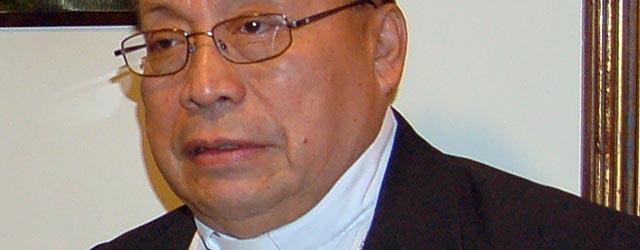Salvadoran Church Urges New Peace Agreement to Deal with Today's Injustices

Bishop Medardo E. Gómez Soto © LWF/DWS Central America/M. Boulogne
Twenty Years on: Insecurity, Violence and Poverty Persist
The Salvadoran Lutheran Church has welcomed government celebrations marking the 20th anniversary of the peace agreement that ended the country’s civil war but called for a new agreement that will return the country to peace and justice.
In an open letter to the President of El Salvador Mauricio Funes on 16 January, Lutheran Bishop Medardo E. Gómez Soto said the anniversary of the signing of the peace agreement that ended the 12-year civil in 1992 offers an opportunity for the country to focus on the insecurity, violence, poverty and injustice that prevail today.
“Twenty years after the signing of the peace agreements, it is important to review and assess what has been achieved with a view to finding an answer to the national reality that we are now experiencing… We need a national re-conceptualization of social peace,” said Gómez in the letter.
“The past 20 years have not been in vain. There have been changes with signs of progress on the road from madness to hope. Conditions at present are favorable for renewing the commitment,” stated the Lutheran bishop.
Gómez issued the letter the same day that President Funes travelled to El Mozote in the municipal district of Meanguera to ask forgiveness for the massacre by the army there in December 1981, when 1,000 defenseless peasants were killed.
Dozens of children were trapped in a convent there when soldiers attacked the venue with flamethrowers and grenades. Various mass graves were later found in El Mozote but those responsible for the crimes were never brought to trial.
Churches Bear Witness
In his open letter marking the anniversary of the signing of the peace agreement, which was spearheaded by the country’s churches, Gómez noted the churches’ peace work was a faithful response to the call of Old Testament prophets and Jesus’ ministry to bring good news to the poor. The country’s churches forged a common ministry to help the victims of the civil war.
“It was a spontaneous response to the crying out of our people, whose blood was being shed, who were hungry, thirsty, persecuted, imprisoned, exiled, dying, victims of injustices amplified by war,” said the Lutheran bishop.
“Confronted with the suffering of our people, the churches learned to be ecumenical; we were able to bear witness, to travel the road together in the face of pain and hope. Responding together to the suffering of our people was more important than differences between our respective ecclesial bodies,” he noted.
The churches organized the Permanent Committee of the National Debate for Peace, which contributed significantly to the dialogue process that ended the civil war and the signing of the peace agreements. The Salvadoran Lutheran Church actively participated in the process, making numerous interventions.
The churches’ efforts were supported by The Lutheran World Federation (LWF), the World Council of Churches and other international bodies as well as churches in Denmark, Finland, Germany, Norway and Sweden.
Rev. Dr Patricia Cuyatti, LWF area secretary for Latin America and the Caribbean, said the LWF endorses the Salvadoran Lutheran church’s call for a renewed agreement at this historical moment, urging the different actors in the country to re-think the notion of peace and justice.
The Salvadoran church “is contributing to the building of a social peace that is grounded in God’s grace and love, which needs to be at the foundation of any reconciling and healing process,” noted Cuyatti.
“Given the history of conquest, war, militarism and the many losses, accountability and just peace become crucial to the member churches, who together with the LWF Communion Office are working to promote actions that express peace,” she added.
The 20,000-member Salvadoran Lutheran Church joined the LWF in 1986.
(634 words)

